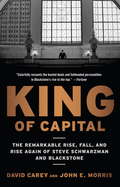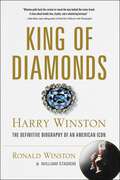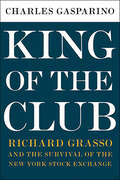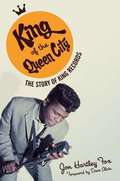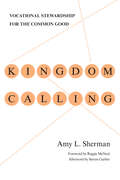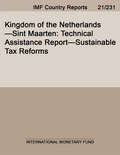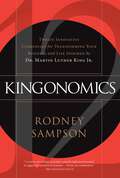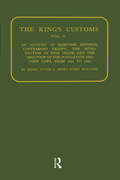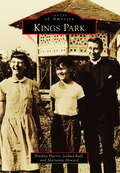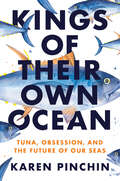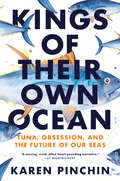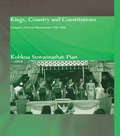- Table View
- List View
King William’s Tontine
by Milevsky Moshe"In a time before bonds, treasury notes, or central banks, there were tontines. These were schemes in which a group of investors lent money to a government, corporation, or king, similar to a modern-day loan syndicate. But unlike conventional debt, periodic interest payments were distributed only to survivors. As tontine nominees died, the income of survivors correspondingly increased. Morbid, perhaps, but this was one of the earliest forms of longevity insurance in which the pool shared the risk. Moshe Milevsky tells the story of the first tontine issued by the English government in 1693, known as King William's tontine, intended to finance the war against French King Louis XIV. He explains how tontines work, the financial and economic thinking behind them, as well as why they fell into disrepute. Milevsky concludes with a provocative argument that suitably modified tontines should be resurrected for twenty-first century retirement income planning"--
King of Capital: The Remarkable Rise, Fall, and Rise Again of Steve Schwarzman and Blackstone
by David Carey John E. MorrisStrippers and Flippers . . . or a New Positive Force Helping to Drive the Economy . . . The untold story of Steve Schwarzman and Blackstone, the financier and his financial powerhouse that avoided the self-destructive tendencies of Wall Street. David Carey and John Morris show how Blackstone (and other private equity firms) transformed themselves from gamblers, hostile-takeover artists, and 'barbarians at the gate' into disciplined, risk-conscious investors. The financial establishment--banks and investment bankers such as Citigroup, Bear Stearns, Lehman, UBS, Goldman Sachs, Merrill Lynch, Morgan Stanley--were the cowboys, recklessly assuming risks, leveraging up to astronomical levels and driving the economy to the brink of disaster. Blackstone is now ready to break out once again since it is sitting on billions of dollars that can be invested at a time when the market is starved for capital. The story of a financial revolution--the greatest untold success story on Wall Street: Not only have Blackstone and a small coterie of competitors wrested control of corporations around the globe, but they have emerged as a major force on Wall Street, challenging the likes of Goldman Sachs and Morgan Stanley for dominance. Great human interest story: How Blackstone went from two guys and a secretary to being one of Wall Street's most powerful institutions, far outgrowing its much older rival KKR; and how Steve Schwarzman, with a pay packet one year of $398 million and $684 million from the Blackstone IPO, came to epitomize the spectacular new financial fortunes amassed in the 2000s. Controversial: Analyzes the controversies surrounding Blackstone and whether it and other private equity firms suck the lifeblood out of companies to enrich themselves--or whether they are a force that helps make the companies they own stronger and thereby better competitors. The story by two insiders with access: Insightful and hard-hitting, filled with never-before-revealed details about the workings of a heretofore secretive company that was the personal fiefdom of Schwarzman and Peter Peterson. Forward-looking: How Blackstone and private equity will drive the economy and provide a model for how financing will work.From the Hardcover edition.
King of Debt – Businessman Donald J. Trump
by Thomas PentzekWho is Donald J. Trump? That’s what the whole world has been wanting to know since November 2016! Those who live outside the US only knew him from his appearances on the reality show The Apprentice, in which he presented himself as a successful businessman. One thing stands out, however: where other millionaires or billionaires shy away from the public, Trump takes every opportunity to put himself out there, to the extent that it is difficult to separate reality from the perfect performance. When researching for my book The King of Debts, I had the opportunity to study the successes and failures of Donald Trump. Every additional affair, every professional failure and every attack on the media I discovered shocked me more. Slowly a picture emerged of the billionaire who in 2017 became the president of one of the most important countries in the world. Why does he react the way he does? Why does he act the way he does? What is the basis for his success in the US?
King of Diamonds: Harry Winston, the Definitive Biography of an American Icon
by William Stadiem Ronald WinstonThis authoritative and intimate biography, written by his only living son, Ronald Winston, marries the Gilded Age glamour and romance of Edith Wharton with the ruthless family dynamics of HBO&’s hit series, Succession. Few American success stories rival that of Harry Winston. Born Harry Weinstein, he came from humble roots—his parents were poor Jewish immigrants who left Ukraine around 1890 for New York, where they settled and started a small jewelry business. His genius for spotting priceless gems emerged young. When Harry was twelve years old, he recognized a two-carat emerald in a pawn shop and bought it for 25 cents, selling it two days later for $800—a massive sum in the early 1900s. From that moment on, Harry became obsessed with gems, especially diamonds. A compact, unassuming man with no formal education, but unlimited drive and ambition, Harry Weinstein transformed himself into Harry Winston, the enigmatic figure who created the world&’s most prestigious luxury brand. Harry Winston built his empire while the Depression raged, World War II reshaped the world, and America entered its post-war period of prosperity. In this riveting biography, readers get a bird&’s eye view of the dangers of the diamond trade and the lengths men would go to get their hands on the best of the &“rough.&” There&’s also a glimpse into the lives of the rich and famous, who clamored for Winston&’s gems. Although he traveled the world doing business with kings, queens, and movie stars, Winston remained a devoted family man, whose chief wish was that his sons carry on the legacy he had built. Harry&’s older son Ronald Winston worked alongside his father for decades. After Harry&’s death, Ron grew the company into the international brand that is still revered today. He ran it expertly, until he was forced to sell the company, due to his younger brother&’s maligning litigation. This is the story of a family business that survived and thrived for more than a century, until it was undone by one, bitter family member. KING OF DIAMONDS is at once a portrait of American ingenuity at its best, and the story of sibling rivalry that is Shakespearean in its tragedy.
King of the Club: Richard Grasso and the Survival of the New York Stock Exchange
by Charles GasparinoRags-to-riches stories abound in American lore, but even Horatio Alger would have been hard-pressed to write one as powerful as Richard Grasso's: the son of a working-class family whose childhood dream was to become a cop. He grew up in New York City's outer boroughs, far removed from the marble halls, expensive suits, and imported cigars of the New York Stock Exchange. Here is the riveting story of how he rose to become the most influential CEO in the Exchange's history. Minus the tony upbringing, affluent prep schools, or inside connections that were de rigueur for top Wall Street players, Grasso would master the subtle deal-making and politics necessary to succeed in the most competitive business on Earth. But despite his successes, Grasso would soon sow the seeds of his own downfall, an event that would change the Exchange forever.The King of the Club paperback edition, featuring a full update on the story, chronicles the amazing rise, fall, and possible rise again of Richard Grasso, and also tells the modern history of the all-powerful institution that he came to symbolize: The New York Stock Exchange.
King of the Queen City: The Story of King Records (Music in American Life)
by Jon Hartley Fox Dave AlvinKing of the Queen City is the first comprehensive history of King Records, one of the most influential independent record companies in the history of American music. Founded by businessman Sydney Nathan in the mid-1940s, this small outsider record company in Cincinnati, Ohio, attracted a diverse roster of artists, including James Brown, the Stanley Brothers, Grandpa Jones, Redd Foxx, Earl Bostic, Bill Doggett, Ike Turner, Roy Brown, Freddie King, Eddie Vinson, and Johnny "Guitar" Watson. While other record companies concentrated on one style of music, King was active in virtually all genres of vernacular American music, from blues and R & B to rockabilly, bluegrass, western swing, and country. A progressive company in a reactionary time, King was led by an interracial creative and executive staff that redefined the face and voice of American music as well as the way it was recorded and sold. Drawing on personal interviews, research in newspapers and periodicals, and deep access to the King archives, Jon Hartley Fox weaves together the elements of King's success, focusing on the dynamic personalities of the artists, producers, and key executives such as Syd Nathan, Henry Glover, and Ralph Bass. The book also includes a foreword by legendary guitarist, singer, and songwriter Dave Alvin.
King of the Queen City: The Story of King Records (Music in American Life)
by Jon Hartley Fox Dave AlvinKing of the Queen City is the first comprehensive history of King Records, one of the most influential independent record companies in the history of American music. Founded by businessman Sydney Nathan in the mid-1940s, this small outsider record company in Cincinnati, Ohio, attracted a diverse roster of artists, including James Brown, the Stanley Brothers, Grandpa Jones, Redd Foxx, Earl Bostic, Bill Doggett, Ike Turner, Roy Brown, Freddie King, Eddie Vinson, and Johnny "Guitar" Watson. While other record companies concentrated on one style of music, King was active in virtually all genres of vernacular American music, from blues and R & B to rockabilly, bluegrass, western swing, and country. A progressive company in a reactionary time, King was led by an interracial creative and executive staff that redefined the face and voice of American music as well as the way it was recorded and sold. Drawing on personal interviews, research in newspapers and periodicals, and deep access to the King archives, Jon Hartley Fox weaves together the elements of King's success, focusing on the dynamic personalities of the artists, producers, and key executives such as Syd Nathan, Henry Glover, and Ralph Bass. The book also includes a foreword by legendary guitarist, singer, and songwriter Dave Alvin.
Kingdom Calling: Vocational Stewardship for the Common Good
by Amy L. ShermanChristianity TodayImagine the scenarios:a CEO successfully negotiates a corporate merger, avoiding hundreds of layoffs in the processan artist completes a mosaic for public display at a bank, showcasing neighborhood heroesa contractor creates a work-release program in cooperation with a local prison, growing the business and seeing countless former inmates turn their lives arounda high-school principal graduates 20 percent more students than the previous year, and the school's average scores go up by a similar percentagetsaddiqimtsaddiqimGod is on the move, and he calls each of us, from our various halls of power and privilege, to follow him. Here is your chance, keeping this kingdom calling in view, to steward your faith and work toward righteousness. In so doing, you will bless the world, and as you flourish, the world will celebrate.
Kingdom of Lesotho: Selected Issues and Statistical Appendix
by International Monetary FundA report from the International Monetary Fund.
Kingdom of Lesotho: Technical Assistance Report-government Finance Statistics (Imf Staff Country Reports)
by International Monetary Fund. Statistics Dept.A report from the International Monetary Fund.
Kingdom of the Netherlands--Netherlands Antilles: Selected Issues and Statistical Appendix
by International Monetary FundA report from the International Monetary Fund.
Kingdom of the Netherlands--Netherlands: Detailed Assessment of Standards and Codes
by International Monetary FundA report from the International Monetary Fund.
Kingdom of the Netherlands--Netherlands: Selected Issues
by International Monetary FundA report from the International Monetary Fund.
Kingdom of the Netherlands—Sint Maarten: Technical Assistance Report--sustainable Tax Reforms (Imf Staff Country Reports)
by International Monetary FundA report from the International Monetary Fund.
Kingonomics: Twelve Innovative Currencies for Transforming Your Business and Life Inspired by Dr. Martin Luther King Jr.
by Rodney SampsonWhile most know of Dr. Martin Luther King Jr.'s sweeping dream of equality and freedom for all, what many do not realize is just how keenly focused he was on economic issues, particularly in his later years. Dr. King believed without economic opportunity, we do not have the chance to pursue happiness. It was, in fact, while planning the Poor People's March, a dramatic stand on economic issues, that his voice was forever silenced. In his final book, Dr. King posed the question, where do we go from here? The answer lies in Kingonomics, a 21st-century interpretation of his economic vision translated through the eyes of Dr. Rodney Sampson, a globally established economic innovator, business developer, and highly successful serial entrepreneur. With 12 currencies (including service, innovation, and reciprocity), Sampson takes pertinent ideas from the life and works of Dr. King and, by combining them with real-life experiences, produces a guide through which one can realize their full potential and personal power. Success does not discriminate, and the road map to it is contained in the pages of this revolutionary new work.
Kingpin: Prisoner of the War on Drugs (Cannabis Americana #2)
by Richard StrattonThis fast-paced sequel to Smuggler's Blues is a harrowing and at times comical journey through the criminal justice system at the height of America's War on Plants.Captured in the lobby of the Sheraton Senator Hotel at LAX following a fifteen-year run smuggling marijuana and hashish as part of the hippie mafia, Richard Stratton began a new journey. Kingpin tells the story of the eight years that followed, through two federal trials and the underworld of the federal prison system, at a time when it was undergoing unprecedented expansion due to the War on Drugs. Stratton was shipped by bus from LA' s notorious Glass House to jails and prisons across the country, a softening process known as diesel therapy. Resisting pressure to falsely implicate his friend and mentor, Norman Mailer, he was convicted in his second trial under the kingpin statute and sentenced to twenty-five years without the possibility of parole.While doing time in prisons from Manhattan's Criminal Hilton to rural Pennsylvania, Virginia, Kentucky, and New York, he witnessed brutality as well as camaraderie, rampant trafficking of contraband, and crimes by both guards and convicts. He first learned the lessons of survival. Then he learned to prevail, becoming a jailhouse lawyer and winning the reversal of his kingpin sentence and eventual release.Kingpin includes cameos by Norman Mailer and Muhammad Ali, and an account of the author's friendship with mafia don Joe Stassi, a legendary hitman from the early days of the mob who knew gangsters Meyer Lansky, Bugsy Siegel, and Abe Zwillman and has insights into the killing of Dutch Schultz and the Kennedy assassinationKingpin is the second volume in Richard Stratton's trilogy, Remembrance of the War on Plants.
Kings Customs: An Account of Maritime Revenue and Conraband Traffic
by Henry Atton Henry H. HollandFirst Published in 1968. This is Volume II of the King's Customs and gives an account of Maritime revenue, contraband traffic, the introduction of free trade and the abolition of the navigation and Corn Laws from 1801 to 1855.
Kings Park (Images of America)
by Bradley Harris Joshua Ruff Marianne HowardNestled amidst a major commuter train line, a state highway, and picture-perfect views of the Long Island Sound and Nissequogue River, Kings Park balances its small-town feel with an excitingly diverse community vibrancy. Kings Park emerged in the late 19th century as the product of a utopian-inspired farm and the first state psychiatric hospital on Long Island. The community has diverse origins, with its foundation built upon thousands of incoming Irish and Italian immigrant workers and an orphanage for African American children. Throughout the 20th and early 21st centuries, Kings Park gradually evolved into a contemporary Long Island suburb, rebuilding after a traumatic downtown fire in 1917, reaping the benefits of one of the North Shore’s largest state parks (Sunken Meadow), and blossoming into a bustling family-oriented place.
Kings of Their Own Ocean: Tuna, Obsession, and the Future of Our Seas
by Karen PinchinThis is a tale of human obsession, one intrepid tuna, the dedicated fisherman who caught and set her free, the promises and limits of ocean science, and the big truth of how our insatiable appetite for bluefin transformed a cottage industry into a global dilemma. In 2004, an enigmatic charter captain named Al Anderson caught and marked one Atlantic bluefin tuna off New England&’s coast with a plastic fish tag. Fourteen years later that fish—dubbed Amelia for her ocean-spanning journeys—died in a Mediterranean fish trap, sparking Karen Pinchin&’s riveting investigation into the marvels, struggles, and prehistoric legacy of this remarkable species. Over his fishing career Al marked more than sixty thousand fish with plastic tags, an obsession that made him nearly as many enemies as it did friends. His quest landed him in the crossfire of an ongoing fight between a booming bluefin tuna industry and desperate conservation efforts, a conflict that is once again heating up as overfishing and climate change threaten the fish&’s fate.Kings of Their Own Ocean is an urgent investigation that combines science, business, crime, and environmental justice. As Pinchin writes, &“as a global community, we are collectively only ever a few terrible choices away from wiping out any ocean species.&” Through her exclusive access and interdisciplinary, mesmerizing lens, readers will join her on boats and docks as she visits tuna hot spots and scientists from Portugal to Japan, New Jersey to Nova Scotia, and glimpse, as the author does, rays of dazzling hope for the future of our oceans.
Kings of Their Own Ocean: Tuna, Obsession, and the Future of Our Seas
by Karen PinchinThe marvelous tale of one fish, the fisherman who first caught her, and how our insatiable appetite for bluefin tuna turned a cottage industry into a massive global dilemma.In 2004, an enigmatic charter captain named Al Anderson caught and tagged one Atlantic bluefin tuna off New England's coast. Fourteen years later that same fish—dubbed Amelia for her ocean-spanning journeys—was caught again, this time in a Mediterranean fish trap. Over his fishing career, Al marked more than sixty thousand fish with plastic tags, an obsession that made him nearly as many enemies as it did friends. His quest landed him in the crossfire of an ongoing fight between a booming bluefin tuna industry and desperate conservation efforts, a conflict that is once again heating up as overfishing and climate change threaten the fish's fate.Kings of Their Own Ocean is an urgent investigation that combines science, business, crime, and environmental justice. Through Karen Pinchin's exclusive interviews and access, interdisciplinary approach, and mesmerizing storytelling, readers join her on boats and docks as she visits tuna hot spots and scientists from Portugal to Japan, New Jersey to Nova Scotia, and glimpse, as Pinchin does, rays of dazzling hope for the future of our oceans.
Kings, Country and Constitutions: Thailand's Political Development 1932-2000
by Kobkua Suwannathat-PianProvides a detailed analysis of Thailand's political development since 1932, when Thailand became a constitutional monarchy, until the present. It examines the large number of different versions of the constitution which Thailand has had since 1932, and explains why the constitution has been subject to such frequent change, and why there have been so many outbursts of violent, political unrest. It explores the role of the military, and, most importantly, discusses the role of the monarchy, which, as the author shows, has been crucial in holding Thailand together through the various changes of regime. The author brings to light original and largely unseen documents from the Public Records Office and US National Archives, as well as drawing upon her extensive knowledge of politics in Thailand.
Kingsford Charcoal
by Das Narayandas Alison Berkley WagonfeldSince the 1980s, Kingsford had continued to enjoy steady, moderate growth of 1% to 3% in revenues each year. During most of this time, the charcoal category as a whole grew as well. However, the summer of 2000 represented the first softening in the category in several years. Forces students to step into the brand manager's shoes, analyze the reasons for the current situation, and come up with recommendations related to pricing, branding and advertising, and merchandising and promotion of the Kingsford brand.
Kinko's
by Gail McgovernOver the decades, Kinko's had forged a deep emotional bond with consumers by easing their anxiety and helping them solve pressing document processing problems. By 2003, however, consumer research revealed that a confusing retail experience had eroded some of this good will. Challenged to increase revenues for this segment and the company as a whole, Kinko's CEO and president faced a momentous decision: Should he radically overhaul the retail business, or should he shift resources to Kinko's healthier commercial business, "harvesting" the retail business for short-term profit?
Kinship and Economic Organisation in Rural Japan (LSE Monographs on Social Anthropology #Vol. 32)
by Chie NakaneIn this essay the author presents the principles of one important sector of social organization in Japan, and establish its framework. Japanese kinship structure, with its multiple historical and local factors, and unlike that of the Chinese or of the Hindus, does not belong to the category of unilineal systems, nor to any kind of descent pattern found in the published literature of social anthropology. Social anthropology, developed by micro-synchronic studies of simpler societies, and with its major analysis devoted to descent systems, has to face in Japan a critical methodological test. In this essay, the author, as a social anthropologist, want to overcome these drawbacks of anthropological method, and to demonstrate one of the new approaches by which an anthropologist can cope with the data from a sophisticated society
Kinyuseisaku: Monetary Policy in Japan (A)
by Laura Alfaro Akiko KannoToshihiko Fukui, Governor of the Bank of Japan, faced a complex situation in the fall of 2007. An economic recovery had allowed the central bank to abandon its zero interest rate policy, which had been in place for years, and raise rates to 0.5%. The Bank of Japan was eager to increase them to more 'normal' levels to exert effective monetary policy. Yet the appropriate timing and approach was a controversial issue, especially as the government did not want a rate hike that could potentially hinder economic growth and increase its already large fiscal debt burden.

